#the sopranos season 5
Text
carmela soprano i love you tony soprano i wish you would die at the hands of carmela
2 notes
·
View notes
Text

...He did what now?
#an ai could generate fake simpsons gags and i wouldn't be able to tell the difference#i stopped watching that show after season 10#it stopped being good after season 5#why is it still on?#the sopranos#2008
2 notes
·
View notes
Text
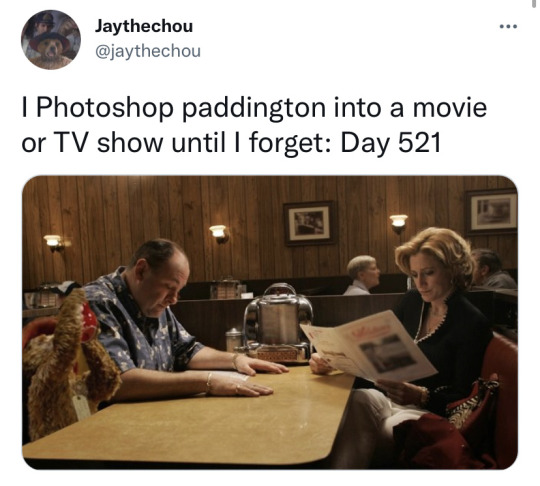
48 notes
·
View notes
Text
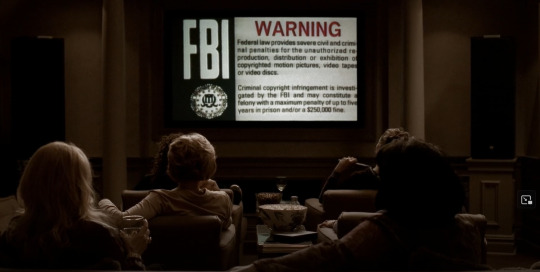

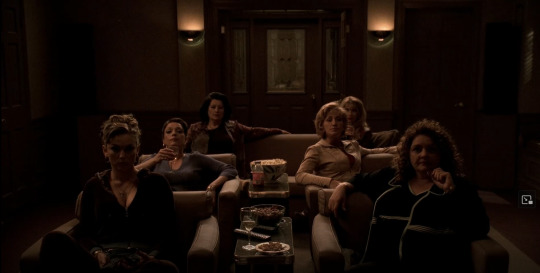
the way I laughed at these 3 frames in succession.
2 notes
·
View notes
Text
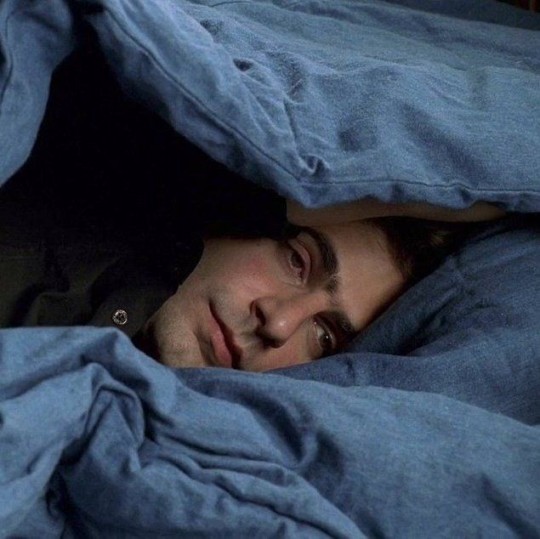
Yeah man, i fucking love the Sopranos, it's so comforting
2 notes
·
View notes
Text
I love the constant dripfeed of people rewatching breaking bad on and off posting screenshots of random funny scenes as it dawns on a lot of people just how much of the show was written to be a comedy
#like its enduring legacy is being a serious show bc of season 5#and as being the arguable apex of the sgat alongside shows like boardwalk empire and the wire and the sopranos etc#so people watch/rewatch it and are genuinely surprised at how ridiculous it is sometimes
12 notes
·
View notes
Photo
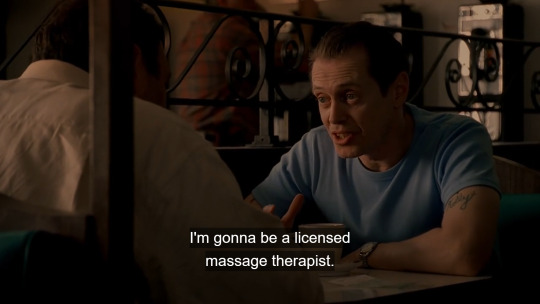
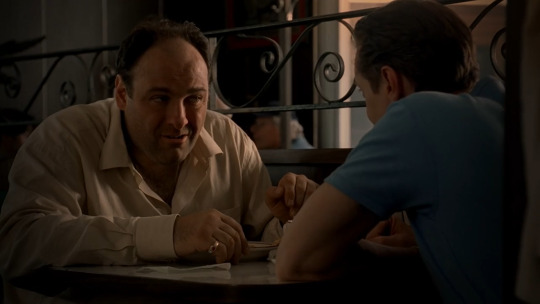
LMAO what 17 yrs of prison does to a mfer
20 notes
·
View notes
Text
tagged by @tripleaxeldiaz and @woodchoc-magnum 🥰🥰
✨8 shows to get to know me✨
01. mad men
02. veronica mars
03. succession
04. the terror
05. community
06. supernatural
07. band of brothers
08. superstore
tagging @crazyassmurdererwall, @tattooedsiren, @machtaholic, @valleydean, @awellwrittenlie, @lupismaris, @zainclaw, and anyone else who wants to do this
#other shows that almost made the cut:#severance + yellowjackets + the office (us) + queer as folk ...#also considered the leftovers + sopranos but i technically never finished either show so didn't feel it was right to include them#(to be fair i also never finished supernatural but those first 5 seasons were SO formative)#(same for veronica mars since i never saw s4)#(both shows i watched in college)
4 notes
·
View notes
Text

#the sopranos#series#best series forever#hbo max#tony soprano#season#fyp#season 5#series gifs#funny#gifs#soprano#hbo#the sopranos edit#series edit#james gandolfini
8 notes
·
View notes
Text
Ada :(
1 note
·
View note
Text
very weird watching this because i feel at the time the matrix was just oh cool hip action film that a teenage boy would like but now i feel like it's considered like a cinematic masterpiece
#sopranos sunday#i'm going to talk about a spoiler in the tags but it's a very minor spoiler it's the level of like#in season 5 aj has an obsession with froot loops (this is a fake spoiler it's just an example)#anyway that's my warning#anyway this feels very funny because of carmela's film club arc later#i wonder what david chase thought of the matrix#in 2024 i don't feel like putting the matrix in a film club with citizen kane would seem unusual but in 2001 i feel like it would be#this is definitely me really overanalyzing a 10 second gag that's only meant to show that aj put 0 thought into carmela's gift lol#the telltale moozadell
0 notes
Text






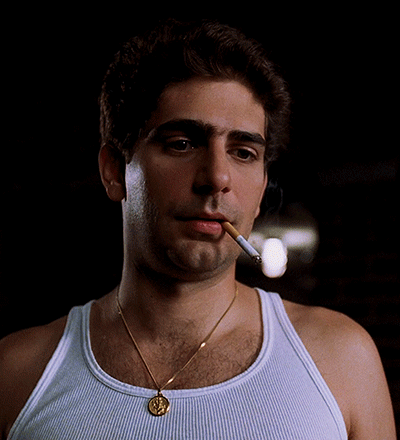
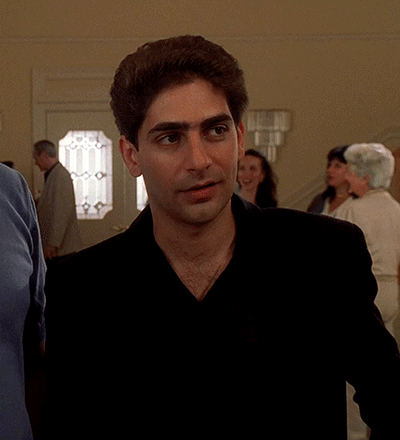
THE SOPRANOS
Season 2 | Episode 5 "Big Girls Don't Cry"
#sopranosedit#the sopranos#sopranos sunday#userrobin#userbrittany#tuserdana#tvandfilm#chewieblog#userstream#uservita#tuserjen#usermikey#dailyflicks#userreh#userquel#michael imperioli#mimperioliedit#usertree#underbetelgeuse#my gifs
281 notes
·
View notes
Text
If I Were You (Yandere!Austin!Elvis x Reader)
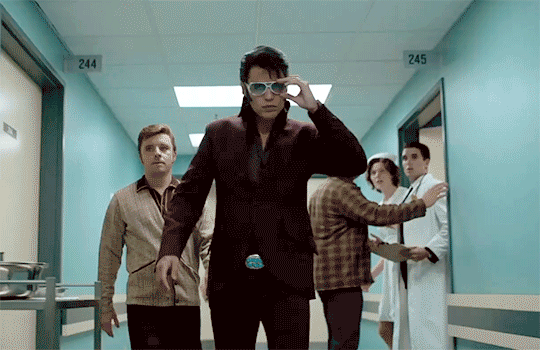
Summary: Elvis takes up Priscilla’s offer to go to rehab for Lisa, and decides to take the steps to break from the Colonel personally and professionally. Elvis is referred to you, a Memphis-based therapist who specializes in helping patients work through codependent or otherwise unhealthy relationships. While he ultimately hopes his turning his life around will give him a better chance of reconciliation with Priscilla, the level of emotional intimacy you allow him in the context of your sessions makes him redirect his attention to you.
Note: This is based on an anonymous request. Reader is a cis woman, but no other descriptors are used. I appreciated having an excuse to rewatch some of my favorite Sopranos episodes because I got a lot of inspiration from seasons 1 and 5. It’s more dialogue heavy than my other fics because of the therapy sessions. I’m not a psychiatrist and nothing in this fic should be treated as legitimate advice regarding mental health, please refer to licensed professionals for that. Look at the warnings before deciding whether or not you want to read this fic because it’s extremely dark. Do not interact with my blog or my posts if you are under 18 or post ED/thinpso content.
Word count: 6.5k
Warnings: This is a yandere fic, so expect dark themes such as emotional blackmail, obsessive and manipulative behavior, and abuse of power, which some people may find disturbing or triggering. The therapy session scenes involve discussions of codependency in relation to parenting and relationships as well as self-blame, death, and drug and alcohol abuse. Explicit sexual content which involves force and coercion and brief daddy kink. Elvis’ mommy issues. Do not interact if you are under 18.
Part 2 | Part 3 | Part 4 (all other parts by @crash-and-cure)
When you received a phone call from Dr. Wilson, one of your colleagues who worked at a rehabilitation facility in San Diego, asking if you were taking new patients, you hadn’t thought much of it when you answered that you were. He elaborated that while the patient was doing well in rehab, he thought he could benefit from continued therapy sessions, particularly because of your specialization and proximity to the patient’s home in Memphis. He informed you that he’d reveal more information about the patient and provide you with the clinical notes he’d taken throughout rehab once he received the patient’s agreement and approval to begin seeing you.
A few days later, you got the follow up call. The patient was interested in being treated by you and had given Dr. Wilson permission to send you copies of the clinical notes. He finally revealed who your Memphis-based patient would be—Elvis Presley. You nearly dropped the phone when he told you. Him going to rehab made sense, his drug and alcohol-fueled antics on stage frequently made entertainment headlines, but you certainly hadn’t expected that he’d need the specialized therapy that you offered.
Elvis still had two weeks left in the rehabilitation program, and you’d receive the clinical notes before then to get an idea of what Dr. Wilson had already addressed with him. When you received the packet at your office’s mailbox, marked with a large ‘CONFIDENTIAL’ stamp on it, you almost hesitated. While aware of his career, you weren’t a huge fan of Elvis’, so that wouldn’t pose a conflict of interest, but you wondered if you could truly be impartial and fair toward a man whose existence permeated almost every aspect of American popular culture.
From what Dr. Wilson had said, Elvis needed help, not as a rockstar but as a man. You were one of less than forty therapists in the country who specialized in helping patients break down codependent relationships. Your office wasn’t far from Graceland at all, ensuring Elvis wouldn’t have to go out of his way for regular therapy sessions.
Finally opening the packet, you were faced with a manila file folder with Elvis’ full name and birthdate printed on the tab. You grabbed your notebook, preparing to write what was relevant for the sessions, but the more you read, it seemed like everything was relevant. A deceased overbearing mother whom Elvis revered as a saint, a manager who exploited his career for decades, and an ex-wife who was burdened with being the man’s stand-in mother and therapist from an alarmingly young age.
You sat back in your chair, exhaling deeply to ground yourself. Taking on Elvis Presley as a client would not be easy, that much was obvious. Most of your clients didn’t have webs as intricately woven as he did, as much to unpack and consider as Elvis. Yet, from the notes, he wanted help. He wanted to change. He didn’t want his daughter Lisa to grow up without a father, but he also wanted a career and a life that he could finally be in control of, where he could be sure of who to trust.
On a Friday afternoon, when you were in between appointments, your phone rang. You answered, resisting the urge to gasp when you heard who was on the other line, despite expecting his call.
“Hello, is Dr. Y/L/N there?” Elvis asked.
“Speaking,” you answered.
“Oh.” He sounded surprised. “Dr. Wilson didn’t mention you were a woman.”
“Is that a problem, Mr. Presley? Because I can refer you to another specialist—“
“No, that’s fine. I just thought you were a secretary or somethin’—no offense.”
“None taken,” you said.
The two of you discussed what his goals for therapy were, and that he wanted to attend twice a week, which was how often he was seeing Dr. Wilson while he was in rehab. Many people were hesitant about therapy since it had an unwarranted stigma attached to it, but you supposed the group therapy and personal sessions in San Diego had proved its effectiveness to him. You agreed to schedule appointments for Monday and Thursday afternoons at 4:30pm and leave the service door to the building unlocked for him, so he could come in at the end of the work day and not have to worry about passersby and other patients seeing him there and causing unwanted attention.
The conversation was short yet pleasant, but if you were being honest, you hadn’t been so nervous about taking on a patient since you first opened your own practice. You had tried to reason with yourself, that he was just a man seeking help like all of your other patients. None of your other patients, however, were Elvis Presley. You managed to calm yourself down the day of his first session, focusing on the other patients you had scheduled.
He arrived fifteen minutes early the day of his first appointment, a non-issue as you had made sure the session before his was wrapped up by four, giving him a window of time to arrive while the office was empty. You took a deep breath before opening the door to the waiting room from your office, and found him staring at a painting on the wall. He turned to you, giving you one of the most dazzling smiles you’d ever seen in your life.
You greeted him with a friendly smile and an outstretched hand. “Good afternoon, Mr. Presley, it’s nice to meet you.”
“Same here, Dr. Y/L/N,” he said, shaking your hand.
“Follow me, and take a seat anywhere you like,” you said, leading him into your office and closing the door behind you.
“Is this some kinda test? You can tell something ‘bout me by which one I pick?” he asked half-jokingly.
You laughed. “No, no, it’s just that we’re going to be sitting for an hour, so I want you to be comfortable.”
He sat in the armchair in front of the bookcase, rather than the one in front of your desk. You grabbed your notebook and sat down across from him. The two chairs were nearly identical anyway, so it didn’t make that big of a difference where either of you sat. Taking a moment to study him, you couldn’t help but acknowledge to yourself how good he looked. You always thought Elvis was a handsome man, but post-rehab, he seemed to be glowing in a way that seemed almost youthful. After allowing yourself to ogle your new patient, you cleared your throat.
“Now, before we begin our first session, I want to establish doctor-patient confidentiality and inform you of your rights as a patient. Is that okay?” you asked.
“Sounds good to me,” he said.
“Wonderful. I take doctor-patient confidentiality seriously. Anything you say in this room will stay in this room. However, if at any point during our sessions you indicate that you intend to seriously harm yourself or others, I would have to go to the police.”
“Seriously harm?”
“Any intentional action that would result in the hospitalization or death of yourself or another individual,” you elaborated, and he gave you a silent nod to continue. “I may encourage you to dig deeper into your psychological and emotional state, you don’t have to answer any questions that you don’t want to, but keep in mind that I’m trying to guide the conversation in a direction that will help you achieve the breakthroughs you want.”
“You know, my mama used to call you psychologists ‘headshrinkers’. Hell, I even do sometimes,” he said with a laugh.
You smiled at the comment, it certainly wasn’t uncommon for people to be skeptical of mental healthcare, but since he’d already brought up his mother, you didn’t want to lose that momentum.
“I completely understand. When I told my parents I was getting my doctorate in psychology, I might as well have told them that I was going to clown school,” you said. “Some people turn to religion for their psychological guidance. My parents are like that. Were yours?”
“Oh yeah, mama was always quotin’ scripture.”
“And your father?”
“He went to church with us sometimes, but it was usually me and mama. I stopped goin’ to church once my career started takin’ off. Didn’t have the time to, but I still love those old gospel hymns.”
You nodded, taking quick notes as he spoke.
“You writin’ that I’m some religious nut in there?”
“No, just general observations, things you’ve mentioned that have appeared while treating other patients. The more I treat people who’ve struggled with codependency, the more I can help others by recognizing patterns of behavior,” you explained. “I read from your file, which thank you for letting me look at by the way, that you experienced this codependent abuse from your former manager, Tom Parker.”
He exhaled, and you made note of his utilizing the coping method to calm himself down.
“The Colonel thought he was entitled to half of everything I made, even though I was the one workin’ myself sick. He had that hack doctor put all kinds of junk in me to keep me movin’ like some walkin’ dead man. That cost me my family and half of everything I ever earned. I’m suin’ the son of a bitch, but I can’t let this happen again.”
“Elvis, I’m sorry that happened to you. You were taken advantage of by someone you trusted. You have every right to be upset and angry. I encourage you to express those emotions while we're here,” you said. “I want to challenge you to stop referring to your former manager as ‘The Colonel’. I think that language is detrimental to your progress as it sets him in a place of authority over you, when in reality, he isn’t and never was.”
He scoffed. “What should I call him then? ‘That piece of shit’?”
You couldn’t help but laugh. “If you’d like, yes.”
For the rest of the hour, he spoke about his former manager, and while you had an idea of what went on from the notes your colleague had given you, the extent was just as bad as you’d expected. As a doctor, you were particularly horrified by the so-called ‘Dr. Nick’ who exacerbated Elvis’ addiction to prescription medications in the name of the almighty dollar. Elvis peppered in mentions of his mother throughout the session as well, and you made a note to dig into that in the future. You weren’t the biggest proponent of Freud, but you knew many people went through life subconsciously mirroring the behavior of their parents unless they made a conscious decision not to.
At the end of the session, you let Elvis know that you admired the progress he’d made so far, both in rehab and his first session with you. He smiled at that, and confessed that even though he wasn’t sure about seeing a woman therapist, as soon as he saw you, he knew there was something different about you, and he already felt comfortable around you. You stayed in your office late to work on the notes for his file while they were still fresh in your mind, and left around a quarter to seven.
The Monday and Thursday sessions continued consistently for the next few weeks, and you were thrilled with how much progress Elvis had made, both in therapy and in his personal life. He was more involved in Lisa Marie’s life and had her over at Graceland regularly, making sure his days were completely clear whenever she was over so he could focus on spending time with her. His sleep pattern had become more regular, with some bouts of understandable insomnia. You and Dr. Wilson had already agreed that with Elvis’ history of addiction, holistic approaches to any psychological conditions would be best, and prescriptions would only be given as an absolute last resort. When he told you that he felt better than he had in years, physically and emotionally, you considered it a huge success, and encouraged him to acknowledge and celebrate that.
Understandably, most of your sessions with Elvis were spent discussing his former manager and the influence and control that he had on Elvis’ career and personal life, particularly the strain it caused on his mother. That was a sensitive issue for him, and he tended to deflect when you tried to bring her up or discuss his relationship with her further. About four months into your treating him, however, he mentioned feeling some resentment toward his father for mismanaging Elvis’ finances, making an off-handed comment about how it wouldn’t have happened if his mother were still alive. You saw this as the opportunity to get him to finally elaborate.
“Your mother was the dominating figure in the family unit, then?” you pressed.
“Mama was a good woman, the best woman. She put food on the table when daddy was in jail. She believed in me before anyone else did.”
“I never said your mother wasn’t a good woman,” you observed. “Why did you jump to that conclusion, that I was attacking her?”
The room was silent for a few moments as he considered your question. “Everyone else did. You know, she was right about not trustin’ the Col–Parker. It’s like when I signed that contract with him I was signin’ her death sentence.”
“Do you blame yourself for her death?”
“I know it was the alcohol. I learned that much in rehab, but in her heart, it was me. She died while I was in basic training, doctor.”
“I’m glad you’re talking through this. It’s going to help with our future sessions, but I want to establish that you’re not responsible for your mother's death anymore than you’re responsible for her other actions throughout her life.”
He shook his head. “Me leavin’, that killed her.”
“Why would your leaving kill her? As I understand, you were drafted. You didn’t have a choice.”
“Because I was supposed to take care of her. My daddy wouldn't, so I did.”
“Do you think it’s right for a child to take care of their parents?” you asked.
“It’s not about what was right,” he argued. “I had to do it.”
“How old were you, when you first stepped into this pseudo-parental role?”
“What?”
“How old were you when you began taking up the household responsibilities that belonged to your father?”
“I was real young, when he went to jail and we had to move. I had a good childhood, though. We didn’t have much, but I had friends and I went to church, did alright in school.”
The hour was almost up, but you knew you were close to reaching a pivotal point in his treatment. As soon as you got him to consider that his codependency issues started with his mother, you could work through his relationships with Tom Parker and even Priscilla, but it’d be easier said than done to drag his mother off of the pedestal he put her on. She’d been dead for over a decade, and yet she still had a spectral stranglehold on her son.
Your intention wasn’t for him to walk out of your office hating his mother, but to recognize the unhealthy behaviors he emulated and to work through the grief he clearly never fully dealt with.
You figured you had time to ask him one more question, and chanced it with, “What do you miss most about your mother?”
“I could tell her anything, and she’d always have something to say. Maybe not what I wanted to hear, but she always meant what she said. I trusted her like no one else. I don’t know if I ever will.”
“It’s hard for you to trust people, with the position that you’re in and how people have taken advantage of you in the past. That can be lonely, and some people engage in self-destructive behavior in an attempt to get the care and attention they yearn for. I believe that you will be able to trust again. Just something to think about as the session ends today,” you said. “You’ve made a lot of progress, and I want to acknowledge that.”
He smiled. “Thank you. You really know your stuff, but I guess that’s what you went to school for.”
“I appreciate that,” you acknowledged. “I hope you have a great rest of your day, Elvis, and I’ll see you at our appointment next week.”
After Elvis left, you worked on your notes from the session to add to his file. You weren’t just paying him lip service before, he had made a good amount of progress, and even despite some of his hesitations, worked through some aspects of the treatment that you expected to be more challenging for him.
The next few sessions, you pressed him more about his mother, and while he pushed back against your insinuating that some of his codependent tendencies originated with her, he did acknowledge that the pressure of not upsetting her did cost him his participation in his high school’s football team, which he loved for the brief amount of time he spent playing. She had been worried about him getting hurt, a pattern you noticed as Elvis spoke to you about his childhood.
You weren’t expecting to find that the root of her anxiety over Elvis’ well-being came from losing his twin, Jesse at birth. Elvis was born into the world having to be two men instead of one, and when his father fell through as the family’s provider, he had to pick up the slack for three. It was a lot for someone to handle even without the challenges of fame. The more you worked with Elvis, the more convinced you became that he could have benefitted from therapy a decade sooner.
In all honesty, you were glad Elvis’ appointments were at the end of the day, because they began to become almost as draining for you as you figured they were for him. Still, he never missed an appointment and always arrived early. The work you did was always difficult, and you couldn’t help but empathize with your patients, but Elvis seemed to take everything out of you.
One weekend, you had plans to get dinner with Mark, a man around your age who you’d met in grad school and had an on-and-off again relationship for a while, before deciding to stay friends. Out of habit you both referred to whenever you’d get together as ‘dates’, and the one you planned was at a higher end restaurant in Memphis. The two of you had been so busy with work that when he called you to catch up, you hadn’t realized it’d been months since you’d seen him. The restaurant was the type of place where you had to make reservations in advance, and so with this in mind, he made one a few weeks prior.
When you and Mark arrived at the restaurant, there was a crowd of loud and restless people overflowing into the street. The two of you pushed your way through to get inside and waited to speak to the host, who informed you that due to unforeseen circumstances, there’d be a thirty minute wait for your table despite your reservation.
The two of you considered leaving and going to a different restaurant, but decided against it, since you had the reservation anyway. To your relief, the wait only ended up being less than five minutes, even though you could tell by the reservation list on the host’s podium that several couples were still ahead of you and Mark.
A waiter led you to your table, and after taking your dinner orders, Mark excused himself to go to the restroom. While waiting for him to return, you could hear people gasp and murmur behind you, until a familiar shadow fell over your table.
“Dr. Y/L/N, funny meeting you here,” Elvis said.
You raised your eyebrows, not expecting to see your high-profile patient of all people in the restaurant. “Mr. Presley, how are you?”
“I’m doin’ just fine.”
“That’s good to hear. I’m glad.”
“Are you here alone?”
“No, my date is just in the restroom.”
His expression shifted, but he nodded agreeably. “Well, have a good night.”
“You too,” you whispered as he walked away.
Fuck. He was upset you were there with someone. It wasn’t uncommon for your patients to temporarily redirect their codependent tendencies onto you, considering the level of emotional intimacy that was involved with the therapy. It’d only once escalated to a level where you felt obligated to refer the patient to another therapist, but you hoped that wouldn’t be the case with Elvis. He’d been making great progress with each session.
When Mark had returned to the table, you gave him a strained smile but continued on with the date as usual. About halfway into your meal, the waiter approached with a bottle of wine neither of you had ordered.
Before you could question anything, the waiter said, “Compliments of Mr. Presley.”
“As in Elvis Presley?” Mark asked.
The waiter nodded and set the bottle on the table. You weakly told him to thank Elvis, and he left to do so. As soon as he was out of earshot, Mark leaned in, “Is Elvis Presley your patient?”
“I won’t answer that, Mark.”
“Holy shit,” he said, opening the bottle of wine.
You didn’t recognize the label from the wine rack at the supermarket and figured it was some expensive brand that was either old or imported, or both. As Mark poured himself a glass, you contemplated whether or not to drink it. Refusing so would confirm that Elvis was your patient, but drinking it would mean you accepted a gift from a patient, both situations required you violating your own code of ethics. Sighing, you let Mark fill your own glass with the wine.
The rest of the night with Mark was fun as you caught up on your personal lives, and Elvis didn’t make a reappearance at all. When Mark walked you back to your car, the two of you promised not to go as long without seeing each other again, and parted with a quick kiss.
You spent Sunday lazily reading in the comfort of your apartment, adjusting the radio in your living room to different stations every so often. All of them seemed to play at least one of Elvis’ songs at some point, and you wondered if you were only noticing the frequency he was on the radio now that he was your patient. Some artists were just radio mainstays, and he was one of them.
On Monday, you knew you’d have to address the situation with the wine to Elvis, but to your surprise, he beat you to it.
“So, how was the wine?” Elvis asked.
“It was kind of you to go out of your way to have something so nice brought to my table, but I can’t accept gifts from patients,” you said. “I hope you understand.”
He narrowed his eyes, leaning over so his elbows were resting on his knees as he asked, “That guy you were out with, he your husband?”
“No, just a friend.”
“You married?”
“No, but–”
“You ever been married?”
“No,” you repeated, “but while we’re on the subject, let’s discuss your marriage and Priscilla.”
You noticed him hesitate to answer. “Is that okay?”
“Sure,” he said.
“How did you meet Priscilla?”
“Her daddy and me were both stationed in Germany at the same time. I met her when she came to a party at my house one night.”
“What attracted you to her?”
“She wasn’t like anyone else I’d ever met in my life. She was beautiful and sweet. I just knew there was somethin’ different about her,” he said, quickly adding. “I was respectful, ya know. She put up with a lot from me, but she was there when I needed someone.”
“You mentioned in a previous session that your mother died while you were in basic training, and after the funeral you were sent to Germany, where you met Priscilla. Do you think you incorporated her into your grieving process?”
He shrugged. “I don’t know. Maybe.”
You kept pressing him for more details, knowing it wasn’t a coincidence that he happened to meet the woman he’d go on to marry after such a devastating loss. The more he elaborated on his relationship, the more you came to understand the codependent nature of it as well. Priscilla became a stand-in for his mother despite her youth, and he began to depend on her the same way. You found it particularly interesting that he encouraged her to dye her hair and gave her the same nickname he had given his mother.
“I understand you and your ex-wife are still close, and she’s part of the reason you’re here. Can I ask you, when you and Priscilla divorced, what you were feeling?” you asked.
“I–I’m sorry, can we talk about something else?”
You nodded, making a note to revisit that later. For the rest of that session and Thursday’s session, the two of you spoke mundanely about how his day to day life was going, the strides he was making to live a more sustainable lifestyle. He informed you that he wanted to make music and perform again, but wouldn’t tour while his lawsuit with Tom Parker was ongoing. Even then, he planned to take it slow, scheduling dates more spaced out to give himself time to rest. He did mention trying to work something out with his team to do one-off performances in the Memphis area in the meantime, to figure out how this new era of his career would go.
The following afternoon, when you usually had an hour or so break between sessions to have lunch, you were interrupted by repeated knocking at your office door. You opened it to find a gift basket on the ground, looking back and forth in the hallway to see if the person who left it was still there, you picked it up and brought it over to your desk. The basket was filled with an assortment of goods that you knew must have been expensive from the brand names that you actually did recognize, and all of the gifts were perfectly suited to your taste. For a moment, you thought it was Mark’s doing, but when you read the attached card, you sighed.
Early on in your career, you had made it a rule to not accept gifts or favors from patients. It helped establish to your patients that you were their doctor, not their friend, as much as you did care for them. You took your ethical responsibility as a therapist seriously, and so you contacted the company where the gift basket had come from, informing them that you’d like them to pick it up and inform the sender that you couldn’t accept it. You’d been expecting the phone call you received about an hour later.
“I tried to get what I thought you’d like,” Elvis said. “Guess I don’t know you as well as I thought.”
“Mr. Presley, I told you in our last session that I don’t accept gifts from patients. I appreciate the gesture, it was extremely thoughtful, but it violates my personal ethics.”
“You drank the wine I sent over to your table,” he argued.
You pursed your lips. You knew letting Mark accept it was a mistake. “That was a completely different scenario. If I had publicly refused, it would have confirmed to my date that you were my patient. I made the decision to respect your privacy.”
From the way he huffed over the phone, he was frustrated. He always did so in sessions when you pressed him to dig deeper into the aspects of the major relationships in his life that he didn’t want to confront. “I understand, doctor. I just wanted to show my appreciation for you, is all. I’ll see you on Monday.”
“Have a good night, Mr. Presley. See you on Monday,” you said.
The next few months went on without incident, and you were pleased with the progress you were making with Elvis. He was willing to open up to you much more, and you found yourself revealing some information about yourself to him as well. Sometimes, it unnerved you how he seemed to remember things you had mentioned in passing weeks or even months before, as if he were taking his own notes on you.
Once in a while, you’d run into him while you were running errands and minding your business in Memphis, having quick and cordial conversations before going your separate ways. Part of you suspected it was deliberate, as a man as famous as him knew he couldn’t step foot anywhere outside of his home without making the news.
On a Friday evening, as you led your last client of the day out of your office, a man you didn’t recognize was standing in the waiting room, looking around at the decor in your office. When you walked out, he looked at you as if he’d seen a ghost.
Before you could speak, he said, “You look really familiar.”
“I don’t know how that could be. I don’t believe we’ve met before,” you said. “I’m Dr. Y/L/N.”
He hesitated before answering. “I must be seeing things, then. I’m Jerry.”
“Nice to meet you, Jerry. May I ask what brings you to my office?”
“Elvis sent me. He’s doing his first show in over a year next weekend, and he wanted me to bring you this VIP pass. Soundcheck, front row seat, backstage access, the works,” he said, holding out the small plastic card to you. “It’s in town, so he’ll send a car for you.”
You shook your head, feeling like a broken record when you declined. “I appreciate the gesture, but I don’t accept gifts from patients. Please send my regards and tell him thank you anyway.”
Jerry nodded. “Alright, nice to meet you, Doc.”
As soon as he left, you collapsed onto the couch. You were making great progress with Elvis, serious progress, but it was clear that he was shifting his codependent tendencies onto you. As much as you didn’t want to, you had to consider referring him to another therapist. It’d be a hassle for him, as the closest therapist with the same specialization as you was located in Nashville. It wasn’t uncommon for your patients to exhibit similar behavior toward you, especially early on in their treatment, but you’d been working with Elvis for nearing a year. You decided to give him the benefit of the doubt, as his case was far more complex than any of your other clients, past or present.
While you were in the supermarket checkout later that evening, you glanced at the tabloid magazines that were displayed next to you, and your eyes nearly bulged out of your head when you saw the cover of most of them–various photos of Elvis, out and about in Memphis with different women who all looked almost exactly like you. Suddenly, you felt as though everyone in the store was staring at you, and you abandoned your cart, rushing out of the store and to your car where you had your first panic attack in years.
As you cried into the steering wheel, attempting to catch your breath, your mind raced at the implications of what you just saw. The women were stand-ins for you, but they weren’t enough for him, they never would be. You knew that if you continued to spurn his advances, they’d only become more elaborate and unavoidable, and by giving him some of the attention he desired, you’d only be encouraging his unhealthy behavior. Your next session with Elvis was that upcoming Monday, and you’d make sure to let him know about your colleague in Nashville and cut all ties with the rockstar.
By the time Monday morning rolled around, you wanted to cancel all of your other appointments for the day, but your other patients didn’t deserve to have their treatment interrupted because of one patient. The day flew by, to your dismay, and 4:30 arrived far sooner than you were ready when he walked through the door and into your office. He sat down in his usual seat, and you resisted the urge to glare at him. You didn’t appreciate being manipulated for personal gain, and you figured he of all people would have understood that.
“Mr. Presley,” you began sternly. “I have repeatedly tried to enforce the professional nature of our relationship as doctor and patient, and yet you insist on sabotaging the massive strides you’ve made in your treatment by repeatedly making attempts to violate that. I think that continuing to see me as a therapist would be detrimental to your recovery, so I’m referring you to a colleague of mine with a similar specialization. After this session, I will no longer be your therapist.”
He stared at you incredulously before becoming stone-faced. “Well, since you won’t be my therapist anymore, I guess you can accept all those gifts now.”
Your mouth nearly fell open at his boldness. “Mr. Presley, you’re missing the point entirely.”
“No, I think I get the point loud and clear, Y/N.”
Your chest contracted as his use of your first name. “Mr. Presley, I’m going to have to ask you to leave. Now.”
He stood up from his chair, and instead of walking out the door, crossed the few feet of space between you and caged you into your chair. He stared down at you intensely, silently, for what felt like hours. Too frightened to move, you held his gaze until he cupped your chin in his hand, gently rubbing his thumb against your skin.
“You’re doin’ this for us, mama,” he whispered, “so we can be together.”
“I’m doing this for my own safety.”
“I knew you felt the same way about me, how much you wanted me too.”
“Elvis, please, let’s just sit back and discuss this. I won’t refer you to another therapist,” you lied, trying to appeal to whatever sense of rationality he may have had.
His other hand drifted to your thigh, inching its way up your skirt. Feeling a rush of adrenaline, you pushed him off of you and hoped that it would disorient him enough for you to run out the door. Instead, he beat you to it, pressing you against the wooden door that stood between your freedom and captivity.
“C’mon, mama, we’ve had this date since the beginning,” he purred in your ear.
Perhaps you had been too preoccupied with having Elvis Presley as a professional success story than acknowledging the delusional and obsessive tendencies he displayed. Where did you go wrong? You tried to think back through a year’s worth of therapy sessions to figure out when exactly you’d given Elvis the impression that you were interested in him romantically or sexually, but were torn from your thoughts when he kissed you aggressively. He must have mistaken your attempts at protests for moans, because he only deepened the kiss, biting your bottom lip so you’d gasp in pain, giving his tongue access to your mouth.
You put your hands on his shoulders to steady yourself and tried once again to push away, but he was too strong–and determined as he backed you into your desk, the impact from both of your bodies bumping against it sending some of the items to the floor.
“Elvis, you don’t have to do this,” you pleaded. Why were you still coddling him?
“You want this, mama,” he groaned, grinding his clothed erection against your exposed leg like a dog in heat. “I know you do.”
He didn’t give you an opportunity to argue, bringing his lips to yours again and hastily unbuttoning your blouse. He rid you of your bra just as quickly, and took one of your breasts in his mouth. Guiding one of your hands to his crotch, he rubbed your hand against it, and you let out an involuntary whimper as his moans vibrated against your sensitive nipple.
Thrusting against your hand, he pulled away from your breast, muttering something about cumming in his pants if he didn’t do anything about it soon. He shed his shirt, throwing it aside. The reality of the situation hit you as he lifted you back on top of the desk and pulled down your panties. He dragged his ring finger up your slit, and you shivered at the sensation of the cold metal of his rings against it. Apparently satisfied with how wet you were, he wasted no time unzipping his pants and ridding himself of them to reveal he hadn’t been wearing any underwear. You stared wide-eyed at his cock, as he stroked it before positioning it at your weeping cunt.
“Just take it, mama. Be real good for me and take it like I know you can,” he cooed in an attempt to placate you as he slid himself into you.
You choked on air at the sensation, not expecting how big he’d be, and tears began to run down your face. He kissed them away as he thrust into you, whispering about how good you were being, how perfect you were. Two of his fingers played with your clit, and your felt your vision go hazy at the pleasure that was building up in your core. You’d never felt that good in your life. Maybe you did want it after all.
“Fuck, daddy,” you moaned, nearly throwing your hands over your mouth at the realization of what you had said.
That seemed to stir something in him, because his thrusts became harsher and more erratic while you berated yourself for actually enjoying it. The moans that came from your throat sounded almost foreign to you.
“You got no idea how often I thought about this, mama,” he managed to groan. “Come for daddy.”
With a grotesque cry, you came, feeling yourself clench around him as he kept up his ruthless pace. His own orgasm followed soon after yours, and as you felt him cum inside you, you weren’t sure whether you hated him or yourself more. What felt like hours passed before he finally pulled out from you, leaving your inner thighs wet with cum and lightly bruised.
You looked at him through your tears, knowing your mascara was surely tracked down your face. He reached for you, and you flinched back, nearly falling off of your desk until he steadied you, and you broke down into humiliating sobs into his shoulder, your nails purposely digging into his skin. You wanted to hurt him, somehow, make him feel how you felt. Instead, he seemed unfazed, releasing you from his grip when your crying had settled down to hold your face in his hands.
He looked into your eyes with all of the delusional affection you’d feared and whispered, “You’re my girl, my bestest girl.”
#elvis x reader#austin!elvis x reader#elvis presley x reader#yandere!elvis x reader#yandere x reader#elvis#elvis 2022#austin!elvis#yandere elvis
2K notes
·
View notes
Text

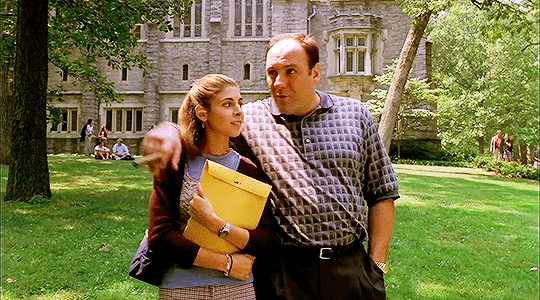

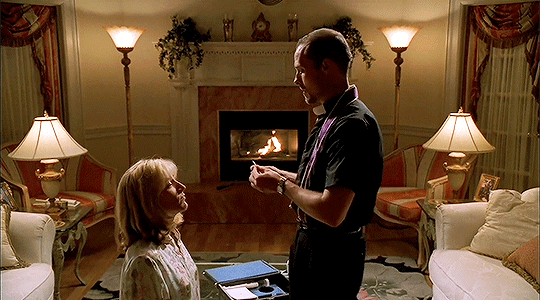


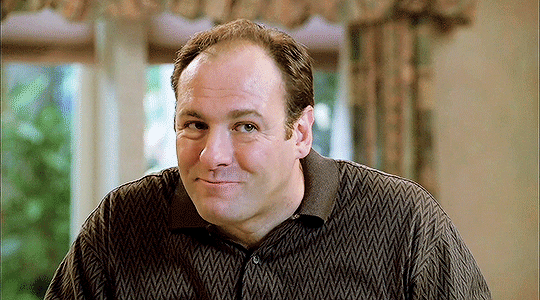
Every Episode of The Sopranos
“College” — Season 1, Episode 5
dir. Allen Coulter
“Are you in the mafia?"
348 notes
·
View notes
Text
There are a lot of good criticisms of the MCU but the dumbest one was always "they expect you to do homework to keep up, why do I have to watch all this shit" and like. Yeah. That's how long-running series work. When you walk into The Godfather part 3 you're expected to have seen 1 and 2 first. When you watch The Sopranos Season 6 they, unsurprisingly, expect you to have seen seasons 1-5.
It's ok to not want to do that but it's not exactly far-fetched here.
69 notes
·
View notes
